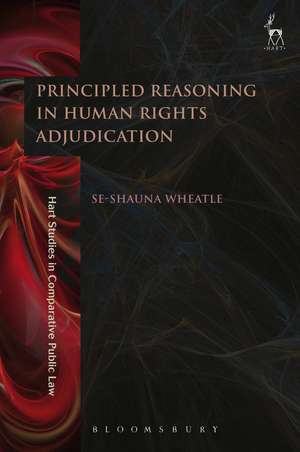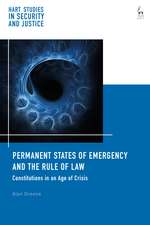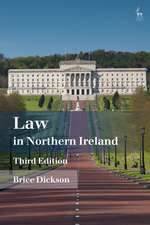Principled Reasoning in Human Rights Adjudication: Hart Studies in Comparative Public Law
Autor Dr Se-shauna Wheatleen Limba Engleză Paperback – 21 aug 2019
| Toate formatele și edițiile | Preț | Express |
|---|---|---|
| Paperback (1) | 270.67 lei 6-8 săpt. | |
| Bloomsbury Publishing – 21 aug 2019 | 270.67 lei 6-8 săpt. | |
| Hardback (1) | 569.53 lei 6-8 săpt. | |
| Bloomsbury Publishing – 19 apr 2017 | 569.53 lei 6-8 săpt. |
Din seria Hart Studies in Comparative Public Law
- 22%
 Preț: 270.67 lei
Preț: 270.67 lei - 18%
 Preț: 305.41 lei
Preț: 305.41 lei - 18%
 Preț: 323.38 lei
Preț: 323.38 lei -
 Preț: 380.87 lei
Preț: 380.87 lei - 23%
 Preț: 386.15 lei
Preț: 386.15 lei - 22%
 Preț: 251.39 lei
Preț: 251.39 lei - 18%
 Preț: 440.31 lei
Preț: 440.31 lei - 22%
 Preț: 227.81 lei
Preț: 227.81 lei - 22%
 Preț: 273.42 lei
Preț: 273.42 lei - 27%
 Preț: 349.13 lei
Preț: 349.13 lei - 22%
 Preț: 272.51 lei
Preț: 272.51 lei - 22%
 Preț: 270.49 lei
Preț: 270.49 lei - 22%
 Preț: 226.42 lei
Preț: 226.42 lei - 23%
 Preț: 171.85 lei
Preț: 171.85 lei - 30%
 Preț: 576.15 lei
Preț: 576.15 lei - 30%
 Preț: 900.07 lei
Preț: 900.07 lei - 18%
 Preț: 380.74 lei
Preț: 380.74 lei - 21%
 Preț: 279.85 lei
Preț: 279.85 lei - 22%
 Preț: 251.75 lei
Preț: 251.75 lei - 17%
 Preț: 315.19 lei
Preț: 315.19 lei - 18%
 Preț: 321.78 lei
Preț: 321.78 lei - 21%
 Preț: 236.30 lei
Preț: 236.30 lei - 18%
 Preț: 321.78 lei
Preț: 321.78 lei - 30%
 Preț: 960.98 lei
Preț: 960.98 lei - 22%
 Preț: 271.94 lei
Preț: 271.94 lei - 22%
 Preț: 239.59 lei
Preț: 239.59 lei - 18%
 Preț: 322.15 lei
Preț: 322.15 lei - 22%
 Preț: 264.17 lei
Preț: 264.17 lei - 22%
 Preț: 264.57 lei
Preț: 264.57 lei
Preț: 270.67 lei
Preț vechi: 348.15 lei
-22% Nou
Puncte Express: 406
Preț estimativ în valută:
51.80€ • 53.88$ • 42.76£
51.80€ • 53.88$ • 42.76£
Carte tipărită la comandă
Livrare economică 14-28 aprilie
Preluare comenzi: 021 569.72.76
Specificații
ISBN-13: 9781509931323
ISBN-10: 1509931325
Pagini: 256
Dimensiuni: 156 x 234 mm
Greutate: 0.36 kg
Editura: Bloomsbury Publishing
Colecția Hart Publishing
Seria Hart Studies in Comparative Public Law
Locul publicării:London, United Kingdom
ISBN-10: 1509931325
Pagini: 256
Dimensiuni: 156 x 234 mm
Greutate: 0.36 kg
Editura: Bloomsbury Publishing
Colecția Hart Publishing
Seria Hart Studies in Comparative Public Law
Locul publicării:London, United Kingdom
Caracteristici
Examines the wider implications of the use of these principles for common law jurisdictions generally.
Notă biografică
Se-shauna Wheatle is an Assistant Professor in Law in the Durham Law School, University of Durham.
Cuprins
1. Introduction: The Doctrinal and Institutional Context I. Map of the Book II. Recurring Themes Part I: The Conceptual Context and the Meanings of the Implied Constitutional Principles2. Implied Principles and Constitutionalism I. Introduction II. On Implied Principles III. Separation of Powers and the Rule of Law in Constitutionalism IV. Conclusion 3. Judicial Conceptions of the Rule of Law I. Introduction II. Conceptions of the Rule of Law III. Development of Heads of Judicial Review IV. Explicit References to the Rule of Law in Applying a Constitution or Bill of Rights V. Conflicts Within the Rule of Law: Equality as an Application of the Rule of Law VI. Conclusion 4. Applications of the Separation of PowersI. Introduction II. Varying Separations of Powers III. Practical Application of the Separation of Powers Principle in Courts in the Westminster-style System IV. Effect of the Separation of Powers on Human Rights V. The Separation of Powers in UK Courts post-HRA VI. Conclusion Part II: Functions Played by the Implied Constitutional Principles of the Rule of Law and Separation of Powers5. Implied Principles as Interpretative Aids I. Introduction II. Distancing Devices in Hard Cases III. Common Ground IV. Institutional Respect V. Conclusion 6. Implied Principles as Grounds for Invalidating Legislation I. Introduction II. The Practice of Invoking Implied Principles as Grounds for Invalidating Legislation III. Trends and Fault Lines IV. Conclusion 7. Implied Principles as Gateways to Comparative Law I. Introduction II. Comparativism in Constitutional Law and Human Rights III. Inheritance from Former Colonial Power IV. Principled Borrowing and a Colonial Legacy V. Developing Common Approaches to Common Problems VI. Cyclical Borrowing VII. Conclusion 8. The Legitimacy of Reliance on Implied Constitutional Principles in Fundamental Rights AdjudicationI. Introduction II. Process of Implication of the Implied Constitutional Principle III. The Type of Use Involved IV. Determinacy V. The Road to Defeat of Constitutional Amendments? VI. Conclusion 9. Conclusion I. Decisional Flexibility II. Distancing Devices and Institutional Defence III. Invitations IV. Continuity and Transition V. Autochthony VI. Concluding Thoughts
Recenzii
Se-Shauna Wheatle's Principled Reasoning in Human Rights Adjudication is a valuable addition to the academic discussion on common law constitutionalism, its main contribution being the teasing out of the mechanisms and functions of implied principles in public law cases with a clearly positioned initial normative assessment.
... a welcome addition to the debate, and a key new release which complements the other titles in the Hart series.
... a welcome addition to the debate, and a key new release which complements the other titles in the Hart series.










